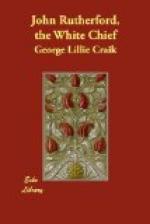But if those who have been accustomed to the comforts of civilization have not infrequently felt the influence of the seductions which a barbarous condition offers to an excited imagination, it may well be conceived that, to the man who has been born a savage, and nurtured in all the feelings and habits of that state of society, they must address themselves with still more irresistible effect.
We have many examples, accordingly, of how difficult it is to extinguish, by any culture, either in an old or a young savage, his innate passion for the wild life of his fathers.
Tippahee’s son, Matara, on his return from England, strove to regain an acquaintance with his native customs. Moyhanger, Savage’s friend, might be quoted as another instance, in whom all the wonders and attractions of London would appear not to have excited a wish to see it again. Nor does any great preference for civilized life seem to have been produced in other cases, by even a much longer experience of its accommodations.
When Nicholas and Marsden visited New Zealand in 1815, they met at the North Cape, where they first put on shore, a native of Otaheite, who had been brought from his own country to Port Jackson when a boy of about eleven or twelve years old. Here he had lived for some years in the family of Mr. McArthur, where he had been treated with great kindness, and brought up in all respects as an English boy would have been. Having been sent to school he soon learned not only to speak English with fluency, but to read and write it with very superior ability; and he showed himself besides in everything remarkably tractable and obedient. Yet nothing could wean him from his partiality to his original condition; and he at last quitted the house of his protector, and contrived to find his way to New Zealand. Here he settled among a people even still more uncivilized than his own countrymen, and married the daughter of one of the chiefs, to whose territories he had succeeded when Nicholas met with him.
Jem (that was the name by which he had been known at Port Jackson) was then a young man of about twenty-three years of age. Unlike his brother chiefs, he was cleanly in his person; and his countenance not being tattooed, nor darker than that of a Spaniard, while his manners displayed a European polish, it was only his dress that betokened the savage.
“His hair,” says Nicholas, “which had been very carefully combed, was tied up in a knot upon the crown of his head, and adorned with a long white feather fancifully stuck in it; in his ears were large bunches of the down of the gannet, white as the driven snow, and napping about his cheeks with every gale. Like the natives, he wore the mat thrown over his shoulders; but the one he had on was bordered with a deep Vandyke of different colours, and gaily bedizened with the feathers of parrots and other birds, reflecting at the same moment all the various shades in the rainbow. He carried a musket in his hand, and had a martial and imposing air about him, which was quite in character with the station he maintained.”




